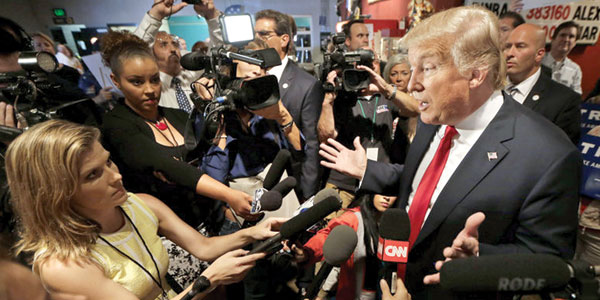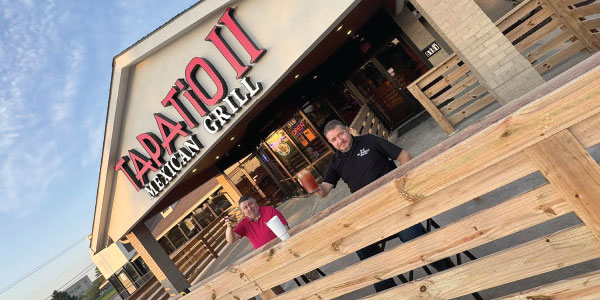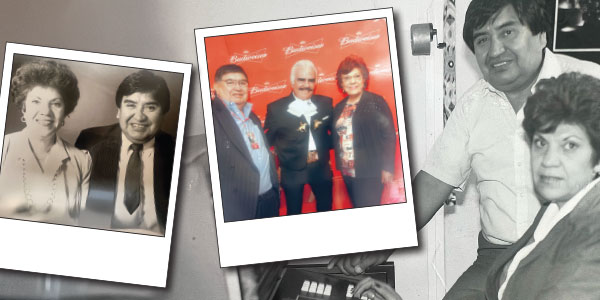
No soy enemigo de Donald Trump. Pero tampoco quiero ser su amigo. Les cuento por qué.
Soy un inmigrante y soy un periodista: Esas dos cosas me definen y marcan mi trabajo. Por eso, cuando Trump lanzó su campaña presidencial en junio del 2015 y les llamó criminales y violadores a los inmigrantes mexicanos, yo sabía que él estaba equivocado y había que denunciarlo.
Trump criminalizó a los inmigrantes durante la campaña, y lo sigue haciendo en la Casa Blanca. Si uno escucha sus discursos — como el que dio al Congreso este mes — uno pudiera creer que todos los inmigrantes son “miembros de pandillas, narcotraficantes o criminales”. Esas palabras usó.
Pero eso es falso. De hecho, los estadounidenses cometen, en promedio, más crímenes que los inmigrantes y terminan con más frecuencia en la cárcel, según un estudio del American Immigration Council. Hay muchos más “buenos hombres” que “malos hombres” entre los inmigrantes en Estados Unidos.
También es mentira que los inmigrantes les quiten los trabajos a los estadounidenses, y que sean una carga para la economía de Estados Unidos, como lo sugiere Trump. Los inmigrantes aportan mucho más de lo que toman en servicios públicos; unos $54.000 millones de dólares de ganancia neta desde 1994 al 2013, de acuerdo con la Academia Nacional de las Ciencias.
Trump, que tanto se queja de las noticias falsas, es el rey del “fake news” por sus frecuentes mentiras sobre los indocumentados.
Ante las falsedades que dice Trump, ¿qué debemos hacer como reporteros?
Primero, somos obligados a informar sobre la realidad como es, no como quisiéramos que fuera. Pero nuestro trabajo debe ir mucho más allá de la simple recolección de datos. No somos grabadoras.
Nuestra principal función social como periodistas es cuestionar a los que tienen el poder. Y cuando alguien como Trump hace comentarios racistas y antiinmigrantes, es preciso tomar una postura y denunciarlo.
Pero es imposible denunciar a políticos como Trump si estamos metidos en la cama con ellos. Tiene que haber una clara distancia entre el periodista y el político. Trump aparentemente cree que sólo los periodistas que simpatizan con él o que son sus amiguitos pueden cubrir con imparcialidad su presidencia.
Se vuelve a equivocar. Los periodistas independientes nunca quieren ser amigos de los presidentes.
Hay una palabra que define perfectamente nuestra función periodística: contrapoder. Debemos siempre estar del otro lado del poder, independientemente de si un Demócrata o un Republicano está en la Casa Blanca.
El principal estratega de Trump, Steve Bannon, dijo hace poco que la prensa es “el partido de oposición”. Y Trump fue aún más lejos cuando dijo en un tuit que los medios de comunicación “no eran enemigos de él sino del pueblo estadounidense”. Trump tiene la piel muy delgada y no le gusta que lo critiquen. Pero no entiende que la labor de la prensa es, precisamente, hacerlo responsable de sus palabras y acciones.
Debido a sus comentarios racistas, sexistas, xenófobos y en contra de los musulmanes, mucha gente no respeta al Presidente. Trump es, por lo tanto, un Presidente que busca desesperadamente validación y respeto. El respeto se gana no lo da ningún puesto.
Si Trump ataca a la prensa y a la primera enmienda de la constitución, no me importa que me vea como su enemigo. (Yo, mientras tanto, seguiré defendiendo la libertad de prensa.) Si Trump ataca el sistema democrático y a los jueces, me tiene sin cuidado si cree que soy el enemigo. (Es falso que 3 millones de indocumentados hayan votado en la pasada elección, como dijo el ahora Presidente.) Y si Trump insiste en culpar falsamente a los inmigrantes y a los extranjeros de los principales problemas económicos y de seguridad nacional, me vale si me identifica como el enemigo. Ese es su problema. Yo sólo estoy haciendo mi trabajo.
No, señor Trump, no soy enemigo de usted, ni de su gobierno. Pero, la verdad, tampoco quiero ser su amigo.
(Esta columna está basada en mi discurso durante la ceremonia de los premios Goldsmith en la universidad de Harvard. Aquí pueden ver parte del discurso: bit.ly/2mOTeOf)
(Jorge Ramos, periodista ganador del Emmy, es el principal director de noticias de Univisión Network. Ramos, nacido en México, es autor de nueve libros de grandes ventas, el más reciente de los cuales es “A Country for All: An Immigrant Manifesto”.)
(¿Tiene algún comentario o pregunta para Jorge Ramos? Envíe un correo electrónico a Jorge.Ramos@nytimes.com. Por favor incluya su nombre, ciudad y país.)
The Press Is Not the Enemy
I’m not Donald Trump’s enemy — but I don’t want to be his friend, either.
I’m an immigrant and a journalist. These two attributes define me, and at age 58, I feel that I’ve been preparing for this moment, for this fight, my whole life.
When Trump launched his presidential campaign in June 2015 by likening Mexican immigrants to criminals and rapists, he left little room for them to be anything else. I knew he was misleading Americans, and I knew it was my duty to stand up to him.
I never expected that Trump — the son of a Scottish immigrant, grandson of a German man and husband of a Slovenian woman — would disparage immigrants throughout his campaign, then continue to do so from the White House. If you listen to his speeches, like the one he recently gave before Congress, you would think that all “illegals,” as he calls them, are “gang members, drug dealers and criminals.”
But that’s simply not true.
First, no human being is illegal, as Elie Wiesel, the Nobel laureate and Holocaust survivor, taught us. Second, Americans who were born in this country commit more crimes on average and end up in jail more often than immigrants, according to a study from the American Immigration Council. There are many more “buenos hombres” in the United States than “bad hombres,” as Trump has labeled millions of people he hopes to deport.
It’s also not true when Trump says that immigrants steal jobs from Americans, or that they are a burden on the U.S. economy. Immigrants contribute much more money to the economy than they receive in public services — a $54 billion net gain from 1994 to 2013, according to the National Academy of Sciences.
Trump, who complains bitterly about fake news constantly, is himself the king of fake news, given his frequent lies about immigrants. But when he makes immigrants scapegoats for our problems in this country, how are we journalists supposed to react?
Trump has forced us to re-examine the role of the media in the 21st century. There are significant moral and ethical components to our profession. We report on the world as it is, not as we want it to be. But our job goes well beyond the dissemination of data.
Our most important role as journalists is to question those in power.
When the president makes racist and anti-immigrant comments, we must confront him. But we cannot do that unless there is a clear distance between journalists and politicians. Trump seems to believe that only the journalists he’s friendly with can report impartially about his presidency. Once again, he’s wrong.
There is a word in Spanish that perfectly defines our journalistic mission: “contrapoder” — or counterpower. We should stand on opposite sides and confront those in power, regardless of whether a Democrat or a Republican is in the White House.
Trump’s chief strategist, Steve Bannon, recently labeled news organizations “the opposition party.” Trump took that a step further when he tweeted that the media “is not my enemy, it is the enemy of the American people!” Trump is very thin-skinned and doesn’t like to be criticized. But he doesn’t understand that it’s the media’s job to hold him accountable for his words and actions.
Now, I don’t know if Trump is racist, sexist or xenophobic, but he must be held accountable for the racist, sexist and xenophobic comments he made during his campaign. They are why so many people don’t respect him — and he is a president who desperately seeks validation and respect.
If Trump attacks the press and the First Amendment, I will defend freedom of speech, even if he considers me an enemy. If he attacks our democratic system and judiciary, I will stand up to him. And if he insists on falsely blaming undocumented immigrants for America’s economic and security woes, I will point out those falsehoods. If he thinks I’m his enemy, no matter. I’m just doing my job.
So no, Mr. Trump, I’m not your enemy, nor your government’s enemy. But to be honest, I don’t want to be your friend, either.
(This column is an adaptation of comments delivered by Jorge Ramos earlier this month at the 2017 Goldsmith Awards Ceremony at Harvard’s Kennedy School. Watch the ceremony here: bit.ly/2mNEanp.)
(Jorge Ramos, an Emmy Award-winning journalist, is a news anchor on Univision and the host of “America With Jorge Ramos” on Fusion. Originally from Mexico and now based in Florida, Ramos is the author of several best-selling books. His latest is “Take a Stand: Lessons From Rebels.” Email him at jorge.ramos@nytimes.com.)










